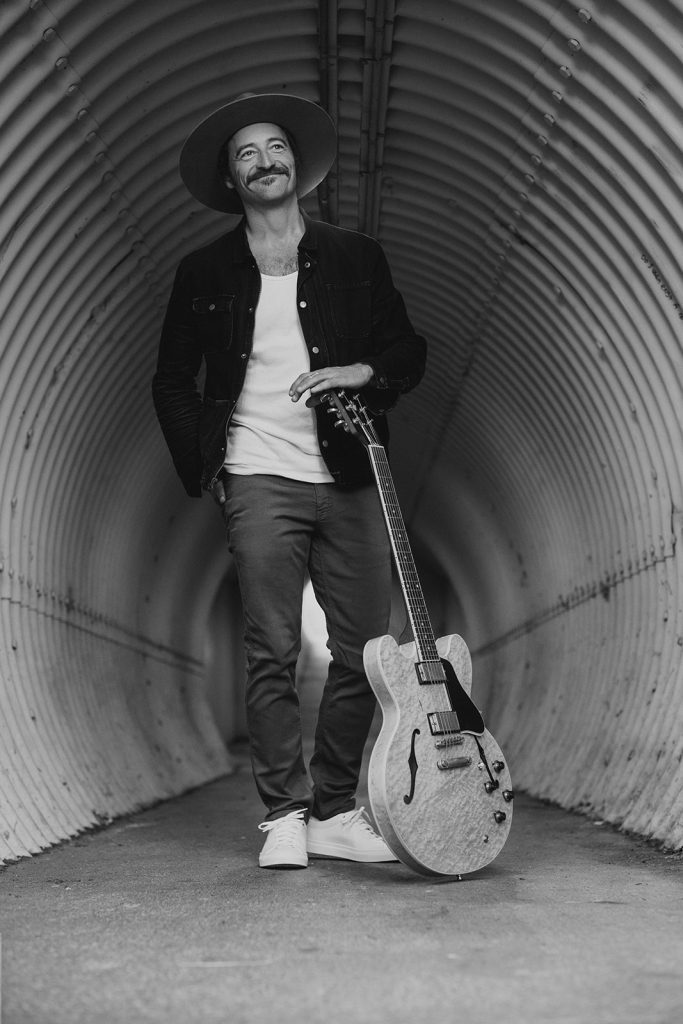
Dylan LeBlanc is a singer-songwriter and multi-instrumentalist who often finds himself flirting with the edge — or “dancing on a razor,” as he calls it — as it is all he has ever known. A verdict vagabond since he was a little boy tossed between Texas, Louisiana and Alabama, LeBlanc thrives on the precipice, never staying in one place for too long. It is that nomadic spirit that drew him not only to a life as a touring musician, but also to the beast that titles his newest record: ‘Coyote.’
LeBlanc says he has always related to the insatiable, scavenging nature of the wily coyote. Much like the animal, LeBlanc is a wanderer who knows when to trust his instincts, musically and otherwise. It is a spiritual kinship that runs deep, but he credits one particularly hair-raising face-to-face instance with solidifying his bond with the animal.
LeBlanc was in Austin, Texas, climbing the face of a 100-foot cliff, gambling with Mother Nature’s good graces as he pulled himself up by tree branches. Once he reached the top, all that laid ahead of him was a lush treeline. There was a breath of stillness, then the sound of a thunderous rustling that drew closer and closer to him. In a blink, LeBlanc watched as a frenzied raccoon came speeding out of the treeline, trailed by an animal that stopped and stared at him with striking intensity: a coyote.
“We’re looking at each other dead in the eyes…and I’m saying — out loud — ‘If it’s you or me, I am going to kick you off the side of this cliff. I’m not going down.’ It was intense, this human-animal moment,” LeBlanc recalls. “I’ve never forgotten that… he was just trying to survive and so was I.”
‘Coyote’ is LeBlanc’s first self-produced release, boasting a cherry-picked lineup of what he calls “killer session players,” such as drummer Fred Eltringham (Ringo Starr, Sheryl Crow), pianist Jim “Moose” Brown (Bob Seger), and bass player Seth Kaufman (Lana Del Rey). Though ‘Coyote’ covers familiar ground for LeBlanc of living on the edge of danger and its many consequences, the record is both autobiographical and a concept album built around the character of Coyote, a man on the run.
The story of ‘Coyote’ progresses linearly, opening with the dizzyingly declarative, strings-heavy title track which details Coyote’s arrival and quick departure as he crosses the border and gets involved with drug cartels. The trouble builds and dark waters rise until track six, “No Promises Broken,” a soaring, against-all-odds love song that marks when Coyote meets a girl, and his luck begins to change for the better. The song tells of how love heals, and places emphasis on lovers remaining open while maintaining their own freedoms, as LeBlanc believes that true devotion does not equal possession. He says that though both Coyote and his love each faced adversity, the hand of destiny put them on the same path and bound them together before they ever met:
“‘No Promises Broken’ is an honest love song about two people who come from the same troubled past, and fate intertwines them together. It’s about acknowledging that there will be hard times ahead, but vowing to stick it out without making promises to each other that they know they can’t keep.”
“Wicked Kind” delves into Coyote’s addiction and warns of ever-present temptation looming on the horizon, and the restraint it takes for him to look away. The LP closes with “The Outside,” the title of which LeBlanc says is meant to be literal, as Coyote is outside of prison walls at last. With boundless slide guitar and skittish keys, it paints a haunting, desert highway vignette of Coyote fighting off lingering ghosts that breed a hesitance so potent that Coyote has to adjust his perspective and remind himself that he is free — the fight is over.
LeBlanc has seen shades of a life not unlike the character of Coyote. He, too, strayed from the straight and narrow and sparred with managing anger in his adolescence. Just as the brutal truth of “Hate” describes that the most gnarled parts of Coyote were molded by his harrowing experiences, it is something LeBlanc feels is universal, as hate does not discriminate.
“I went to school with people from all walks of life. We were different, but we thought, ‘We’re all poor,’ so we’re all in the same boat. We all grew up in chaos. It was the ‘90s in Louisiana on the border of Texas… that air was thick, man. Sink or swim type of mentality.”
LeBlanc is the first to warmly acknowledge his rough edges and tendency to chest-up to conflict, both the result of the volatility and instability of his youth. Now, no longer a boy who always had to be on alert and ready to defend himself, LeBlanc recognizes that his roots do not define or limit the man he is today. The cover art of a coyote wounded by arrows reflects just that, symbolizing LeBlanc’s resilience through what he has experienced:
“The coyote is still upright, even though he’s full of arrows, even though he has been shot at and wounded many times. He still keeps going in defiance of everything that has been thrown at him. You can’t get an arrow out completely. You can break one side of it off, but the arrow is still there… there’s still a scar. It becomes a part of you… of your identity.”
Considering the distinct wisdom and lifetimes in his voice, it is no surprise that LeBlanc has known hardships, but he is a shining example of what beauty comes from perseverance. LeBlanc’s tenacity has paid off in spades, leading him to a record deal with ATO Records, releasing the critically acclaimed ‘Renegade’ in 2019, and now ‘Coyote,’ which LeBlanc says is “the record he has always wanted to make.”
Now in his thirties with a fiancé and a daughter he adores, LeBlanc is the closest he has ever been to the man he has always strived to be. With endearing candor, he confesses he is still learning to be less hot-headed and more gentle; but he doesn’t think about dying every day, like he used to. LeBlanc credits fatherhood for the perspective he has now on what matters, and his key concern is remaining devoted to those he loves most. Though far removed from a perilous life like Coyote’s, LeBlanc admits he still feels as if he is dancing on a razor’s edge all the same. The goodness he is surrounded by only gives him more to lose, with each glimmer carrying an asterisk of fear. One misstep and he worries that it all could vanish, but the lionhearted LeBlanc seems to forget he once unnerved even a wild coyote with his eyes alone.

Jesse Roper
Based in Victoria, BC, Jesse Roper is a blues/Americana artist with a penchant for writing modern indie-infused blues music and delivering bombastic live performances buoyed by his virtuosic guitar playing. His innate and impressive musical talent has served him well, giving him the flexibility to play with soul icon Booker T. Jones, rock veteran Colin James, blues belter Beth Hart, and Canadian legend Burton Cummings. The stage is where Roper shines. It has been his home since overcoming crippling stage fright during his early twenties. Fear is a part of Roper’s past that barely seems real today – especially when you see the in-concert image of a six-string soldier, hair matted to his face, tearing up the stage, without a hint of second-guessing.
Roper’s last album ‘Horizons’ marked a sonic high point in his career thus far. Working closely with famed JUNO-nominated producer Gus van Go (Metric, The Stills, Whitehorse, Arkells, The Trews, Sam Roberts) on that new collection of songs has pushed Roper into creating some of his best work. “Recording with Gus and Werner F was on a whole new level.
Roper released the first single off his upcoming LP (to be released in late 2023) “Make It All Work Out” on March 29th, 2023. The song charted on Canadian terrestrial and satellite radio throughout the spring and early summer. Now all eyes are on the next release, “Throw This Rope” produced by Gus van Go (Metric, Whitehorse, Sam Roberts Band). The song will be the second of multiple energetic, fresh, soulful and r&b inspired tracks from a forthcoming LP that harkens the voices of JJ Cale, The Teskey Brothers, Ben Harper and others – while maintaining Roper’s strong and unique expression in the genre.
When asked to describe the song, Jesse remarks, “Throw This Rope is about being told how to run your life and career by folks who are currently running theirs aground. I sure don’t know everything and I never will but I’ve been given every manner of advice from folks who have no idea what they’re talking about. It’s frustrating sometimes.”
Jesse is a master at connecting his personal story and experiences to his songwriting – crafting narratives that hit on life’s challenges and eccentricities – but that remain upbeat, engaging and wildly entertaining songs.
Adventuresome doesn’t properly describe Roper as an artist, because when the guitar-wielding dynamo sets out to accomplish something, there’s no telling where his mind will wander, or when his energy will go.



